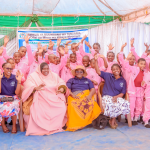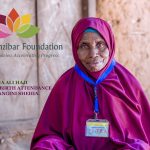DAR ES SALAAM, 1 January 2020 – An estimated 5,000 babies will be born in Tanzania on New Year’s Day, UNICEF said today, out of the estimated 392,078 babies to be born on New Year’s Day according to the data estimated by World Data Lab published on the UN’s World Population Prospects (2019).
“The beginning of a new year and a new decade is an opportunity to reflect on our hopes and aspirations not only for our future, but the future of those who will come after us,” said Henrietta Fore, UNICEF Executive Director. “As the calendar flips each January, we are reminded of all the possibility and potential of each child embarking on her or his life’s journey—if they are just given that chance.”
Fiji in the Pacific will most likely deliver 2020’s first baby. The United States, its last. Globally, over half of these births are estimated to take place in eight countries:
- India — 67,385
- China — 46,299
- Nigeria — 26,039
- Pakistan — 16,787
- Indonesia — 13,020
- The United States of America — 10,452
- The Democratic Republic of Congo — 10,247
- Ethiopia — 8,493
Each January, UNICEF celebrates babies born on New Year’s Day, an auspicious day for child birth around the world. However, for millions of newborns around the world, the day of their birth is far less auspicious.
In 2018, 2.5 million newborns died in just their first month of life; about a third of them on the first day of life. Among those children, most died from preventable causes such as premature birth, complications during delivery, and infections like sepsis. In addition, more than 2.5 million babies are born dead each year.
In Tanzanian children have a much better chance of surviving past their fifth birthday today compared to the situation in previous years. The Government’s high-impact programmes such as immunization, promotion of breastfeeding, Vitamin A supplementation, prevention of mother-to-child transmission of HIV, and improved management of common childhood illnesses, have saved lives of children across the country.
However, Tanzania is among countries with the highest number of newborn deaths in the world. According to the United Nations Children’s Fund Levels and trends in child mortality report (2019), Tanzania has 44,082 neo-natal deaths that occur during the first 28 days of life and 76,644 infant deaths during the first year of life. Babies dying in the first month of life accounted for 41.3 per cent of all deaths among children under five in 2018, up from 25.2 per cent in 1990.
“Eeveryone need to ask themselves how can we make sure that no child in Tanzania dies any longer from preventable causes, especially in the first monthof llife. What do the health workers and communities need to do differently to prevent this from happening,” Rene Van Dongen, UNICEF Tanzania Deputy Representative posed.
To address the issue of maternal and newborn deaths in the Country, the Ministry of Health, Community Development, Gender, Elderly and Children, UNICEF and other stakeholders launched JIONGEZE campaign in 2019, a multi-year campaign on maternal and child survival. The campaign emphasizes on the 4 life-saving Ps;
- Place: need for clean and functional health facilities within reach of every mother and baby 24 hours, 7 days a week
- People: sufficient number of well- trained midwives and other health workers equipped with tools needed to keep every mother and baby alive and healthy
- Products: life-saving drugs and equipment available for every mother and baby
- Power: adolescent girls, women and families empowered to demand and receive quality health care services.
The campaign led to increased awareness and prioritization of reducing preventable maternal and newborn deaths and reached out to different stakeholders’ networks including media and inter faith-leaders in mainland and Zanzibar.
Over the past three decades, the world has seen remarkable progress in child survival, cutting the number of children worldwide who die before their fifth birthday by more than half. But there has been slower progress for newborns. Babies dying in the first month accounted for 47 per cent of all deaths among children under five in 2018, up from 40 per cent in 1990.
UNICEF’s Every Child Alive campaign calls for immediate investment in health workers with the right training, who are equipped with the right medicines to ensure every mother and newborn is cared for by a safe pair of hands to prevent and treat complications during pregnancy, delivery and birth.
“Too many mothers and newborns are not being cared for by a trained and equipped midwife or nurse, and the results are devastating,” added Fore. “We can ensure that millions of babies survive their first day and live into this decade and beyond if every one of them is born into a safe pair of hands.”






